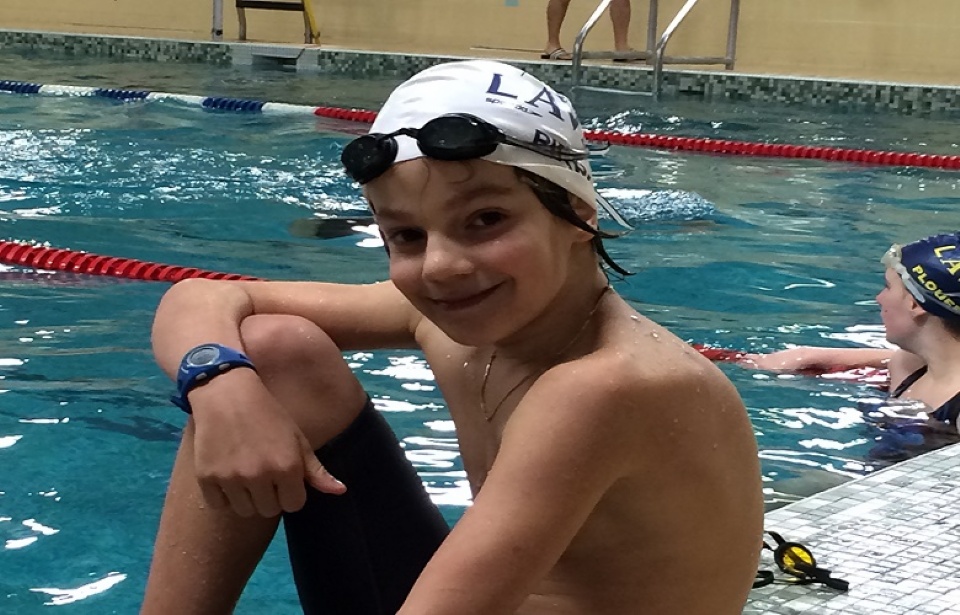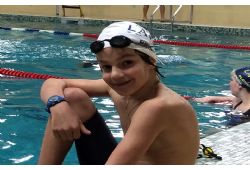Being defeated is often a temporary condition. Giving up
is what makes it permanent. So says Marilyn vox Savant, who
according to the Guinness Book of Records, her 190 IQ ranked the highest in the
world in the 1980s. Although succinct and to the point, many of us find it
difficult to live by those words. A failed marriage, losing a job, or the death
of a loved one can quickly turn into a crutch that can send an individual
spiraling into an abyss they have difficulty climbing out of. That is what
makes Matteo Pirro's story so inspiring; he is a 10 year-old who innately
grasps that a setback is not an excuse to throw in the towel.
Matteo's mother, Marie-Jo Demers, describes her son, who
has dyslexia, dysorthographia, and dyscalculia as an enthusiastic, happy child
who struggles with a learning disability that makes it difficult for him to
write, recognize words and decode mathematics. “He grasps well, and his grades
are solid, but he works so much harder than his classmates that he often tires
himself out. He's like a right-handed person attempting to write with his left
hand,” explains Demers.
When Matteo was asked what issues confounded him the most
at school, he answered, "Everything." Then after a moment of reflection,
added, "Mostly reading, writing, paying attention and having to sit still
for so long."
For Demers, who also struggles with dyslexia, she is well
aware of how trying some of the difficulties both Matteo and his younger
brother Luca, who is dealing with dysphasia, face. But unlike Luca, who manages
to do well in school, it was difficult for her watch Matteo struggling with
concepts others quickly pick up.
“Back when I was a child, I wondered, despite excelling at
poetry, science and computers, why I struggled with spelling and memorization
of math tables, and it was difficult not to let that fact affect my confidence.
Even today with all the heightened awareness about such conditions, it still
has an impact on a child's self-esteem,” says Demers. “So, I remind my kids,
all that time, how smart they are, encouraging them not to become frustrated
because they learn differently.”
Like many people with dyslexia, Matteo is very creative.
Demers says that he has many ideas for inventions and that he loves art and
painting. Although those attributes are important parts of an education, Demers
believes that the school system's rigidness doesn't lend itself enough to
Matteo's strengths. “That's why we pulled him out of school last year. He was
exhausted trying to keep up with the other students. So Ivano (Matteo's
father), Matteo and I came to the conclusion that it would be better to teach
him at home.”
As a consequence, Matteo managed to grasp some of the
fundamental concepts that were holding him back and catch up with his peers.
“So there is another way of doing things that make it easier for him,” Demers
says.
When questioned how homeschooling made a difference
improving his reading and math skills, Matteo said that he discovered a new way
of learning that was different than writing notes in a book and taking tests.
Matteo attributed his newfound confidence to his mother. "When I was
struggling with learning certain things, she was very patient and helpful and
would always say, 'you've got this!' It has given me the courage to trust in
myself and try," he says.
This past school year Matteo returned to school to
join his classmates. It was his choice, Demers says, because he wants to ‘be
like everyone else’.
Matteo's mother understands that building a winning
attitude is essential to her son's development. So when he expressed an
interest in swimming, he received encouragement. “Swimming and being physical
releases dopamine, ensuring that his mood remains positive,” explains Demers.
His newfound confidence doesn't stem from improved physical fitness alone.
“It's done wonders for his math skills. When his coach asks him to swim 100
meters, he has to divide the length of the pool into 100. And because he is
passionate about swimming it motivates him to calculate the solution,” says
Demers.
Matteo began swimming at the Laval Swim Club, as a
novice, last year. In the period since, he has achieved his Provincial
Development time standards. “Right now he swims three days a week. Four days
would be the ideal, but with the extra time he needs for homework, it might be
taxing him more than he should be pushed,” explain Demers.
"I feel free when I'm in the water," Matteo
says. "I also like racing in the pool and winning. It makes me feel good
about myself." He says that swimming has taught him to never give
up. Competitive swimming, he admits, is hard work. "But I know I have the
strength to go through practices and it makes me feel proud getting better and
faster!"
Now that the ten-year-old recognizes that obstacles are
surmountable, he can see how a correct attitude ensures that setbacks are only
temporary. It is a life lesson taught to him by his mother, for which he will
be forever grateful.

 In The Latest Issue:Latest Issue:
In The Latest Issue:Latest Issue:
- A Bittersweet Farewell
- The new Laval Aquatic Co...
- The End of an Era:
Articles
Calendar
Virtual- ANNUAL TEACHER APPRECIATION CONTEST
- APPUI LAVAL
- ARTS & CULTURE
- CAMPS
- CAR GUIDE
- CCIL
- CENTENNIAL ACADEMY
- CHARITY FUNDRAISING
- CITYTV
- COSMODÔME
- COMMUNITY CONNECTIONS
- COVER STORY
- DINA DIMITRATOS
- ÉCOLE SUPÉRIEURE DE BALLET DU QUÉBEC
- EDITORIALS
- ÉDUCALOI
- EDUCATION
- EMPLOYMENT & ENTREPRENEURSHIP
- FÊTE DE LA FAMILLE
- FÊTE DU QUARTIER SAINT-BRUNO
- FAMILIES
- FESTIVAL LAVAL LAUGHS
- FÊTE DE QUARTIER VAL-DES-BRISES
- FINANCES
- GLI CUMBARE
- GROUPE RENO-EXPERT
- HEALTH & WELL-BEING
- 30 MINUTE HIT
- ANXIETY
- CHILDREN`S HEALTH & WELLNESS
- CLOSE AID
- DENTAL WELLNESS
- EXTREME EVOLUTION SPORTS CENTRE
- FONDATION CITÉ DE LA SANTÉ
- GENERAL
- HEARING HEALTH
- MESSAGES FROM THE HEALTH AGENCY OF CANADA
- MENTAL HEALTH
- SEXUALITY
- SOCIAL INTEGRATION
- SPECIAL NEEDS
- TEENS
- THE NUTRITION CORNER
- THE NUTRITION CORNER - RECIPES
- VACATION DESTINATION
- WOMEN'S FITNESS
- WOMEN'S HEALTH
- HILTON MONTREAL/LAVAL
- HOME & GARDEN
- INTERNATIONAL WOMEN'S DAY
- JAGUAR LAVAL
- LAVAL À VÉLO
- LAVAL FAMILIES TV SHOW
- LAVAL FAMILIES MAGAZINE CARES
- LAVAL URBAN IN NATURE
- LE PARCOURS DES HÉROS
- LES PETITS GOURMETS DANS MA COUR
- LEON'S FURNITURE
- LEONARDO DA VINCI CENTRE
- LFM PREMIERES
- LIFE BALANCE
- M.P. PROFILE
- MISS EDGAR'S AND MISS CRAMP'S SCHOOL
- MISSING CHILDREN'S NETWORK
- NETFOLIE
- NORTH STAR ACADEMY LAVAL
- OUTFRONT MEDIA
- PASSION SOCCER
- PARC DE LA RIVIÈRE-DES-MILLE-ÎLES
- PÂTISSERIE ST-MARTIN
- PIZZERIA LÌOLÀ
- PLACE BELL
- PORTRAITS OF YOUR MNA'S
- ROCKET DE LAVAL
- SACRED HEART SCHOOL
- SCOTIA BANK
- SHERATON LAVAL HOTEL
- SOCIÉTÉ ALZHEIMER LAVAL
- STATION 55
- STL
- SUBARU DE LAVAL
- TECHNOLOGY
- TEDXLAVAL
- TODAY`S LAURENTIANS AND LANAUDIÈRE
- TODAY`S LAVAL
- WARNER MUSIC
- THIS ISSUE
- MOST RECENT
Magazine
Matteo Pirro’s Story
Articles ~e 105,7 Rythme FM 4 chemins Annual Teacher Appreciation Contest Appui Laval Arts & Culture Ballet Eddy Toussaint Camps THIS ISSUE MORE...
CONTESTS Enter our contests
CONTESTS Enter our contests
CALENDAR
Events & Activities
COMMUNITY Posts Events
PUBLICATIONS Our Magazine Family Resource Directory
LFM BUSINESS NETWORK Learn more
COUPONS Click to save!
COMMUNITY Posts Events
PUBLICATIONS Our Magazine Family Resource Directory
LFM BUSINESS NETWORK Learn more
COUPONS Click to save!
SUBSCRIPTIONS
Subscribe to the magazine
Un-Subscribe
E-NEWSLETTER Subscribe to our E-newsletter Un-Subscribe
WRITE FOR US Guidelines & Submissions
POLLS Vote today!
E-NEWSLETTER Subscribe to our E-newsletter Un-Subscribe
WRITE FOR US Guidelines & Submissions
POLLS Vote today!
ADVERTISERS
How to & Media guide
Pay your LFM invoice
SUGGESTIONS Reader's Survey Suggest a Listing
LFM About Us Our Mission Giving Back Contact Us
SUGGESTIONS Reader's Survey Suggest a Listing
LFM About Us Our Mission Giving Back Contact Us
 PICK-UP LOCATIONS
Get a copy of LFM!
PICK-UP LOCATIONS
Get a copy of LFM!
TERMS & CONDITIONS Privacy | Terms
ISSN (ONLINE) 2291-1677
ISSN (PRINT) 2291-1677
Website by ZENxDESIGN




 BY:
BY: 
Tweet
Share